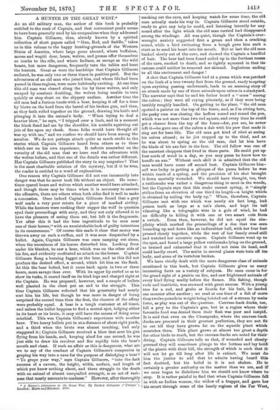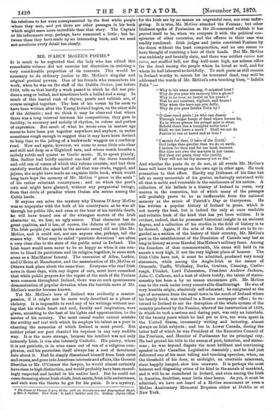A HUNTER IN THE GREAT WEST.* As an old military
man, the author of this book is probably entitled to the rank of Captain, and that convenient prefix seems to have been generally used by his companions when they addressed him. Captain Gillmore, then, already known by a spirited collection of short papers called "Gun, Rod, and Saddle," takes us in this volume to the happy hunting-grounds of the Western States of America, where large game abound, where buffaloes, moose and wapiti deer, bears, wolves, and pumas offer themselves as marks to the rifle, and where Indians, as savage as the wild beasts, but more dangerous, frequently turn the tables and hunt the hunters. Great as were the hardships that Captain Gillmore endured, he was only two or three times in positive peril. But the adventures of an old man who joined him, and whose life had been passed in those regions, were more habitually exciting. At one time this old man was chased along the ice by three wolves, and only escaped by constant doubling, the wolves being unable to turn quickly or stop short on the slippery surface. Another time the old man had a furious tussle with a bear, keeping it off for a time by blows on the head from the barrel of his broken gun, and then, as they both rolled together on the ground, drawing his knife and plunging it into the animal's body. "When trying to deal a heavier blow," he says, "I tripped over a limb, and in a moment the black fiend had me by the shoulder, his nostrils squirting out jets of fire upon my cheek. Some folks would have thought all was up with me," and we confess we should have been among the number. We do not perhaps attach quite as much credit to the stories which Captain Gillmore heard from others as to those which rest on his own experience. It reflects somewhat on the veracity of the old man that we have read the adventure with the wolves before, and that one of the details was rather different. Has Captain Gillmore published the story in any magazine ? That is the most charitable solution of the mystery, but if it be true, the reader is entitled to a word of explanation.
One reason why Captain Gillmore did not run incessantly into danger was that he never took life without an object. He some- times spared bears and wolves which another would have attacked, and though there may be times when it is necessary to assume the offensive, there are others when both sides find it well to make a concession. Once indeed Captain Gillmore found that a grey wolf made a very poor return for a piece of marked civility. While the hunters were cooking their supper the wolf in question eyed their proceedings with envy, and they not only allowed it to have the pleasure of seeing them eat, but left it the fragments. Yet after this it had the base ingratitude to be seen near one of their horses," with an unmistakable look of guilty intentions in its countenance." Of course this made it clear that mercy was thrown away on such a ruffian, and it was soon despatched by a bullet. Again, Captain Gillmore was once camping out alone, when the uneasiness of his horses disturbed him. Looking from under his blanket, he saw a bear, which was on the other side of his fire, and evidently meditated an attack on the horses. Captain Gillmore flung a burning faggot at the bear, and as this did not produce the desired effect, a second, which hit him on the flank. At this the bear bolted, but it came back again in two or three hours, more savage than ever. With its upper lip curled so as to show its tusks, it reared itself on its hind-legs and charged right at the Captain. He was prepared, however, and a couple of bullets well planted in the chest put an end to the struggle. This time Captain Gillmore reflected that his generosity had nearly cost him his life, but though he was more in danger of being surprised the second time than the first, the chances of the affray were probably equal. A bear is a tough customer at all times, and unless the bullet happens to find a mortal spot, lodging either in its heart or its brain, it may still have the means of doing some mischief. This was Captain Gillmore's experience with another bear. Two heavy bullets put in at a distance of about eight yards, and a third when the brute was almost touching, had only staggered it ; Captain Gillmore received a blow that sent his gun flying from his hands, and, keeping aloof for one second, he was just able to draw his revolver and fire rapidly into the bear's mouth and chest. If such an affair as this is dangerous, what are we to say of the conduct of Captain Gillmore's companion in groping his way into a cave for the purpose of dislodging a bear ? "To grope your way," says Captain Gillmore, "into the dark recesses of a cavern, the height, width, surface, and length of which you know nothing about, and there struggle to the death with an animal of almost unequalled strength, is an act of rash- ness that nearly amounts to madness." However, after thoroughly
• A Hunter's Adventures in the Gnat West. By Parker etllmore trbique "). London; Hurst and Blackett. 1870. smoking out the cave, and keeping watch for some time, the old- man actually made his way in. Captain Gillenore stood outside, ready to give any help he could, and listening intently for any sound after the light which the old man carried had disappeared among the windings. All was quiet, though the Captain's over- wrought anxiety suggested first a groan and then a cracking sound, while a bird twittering from a bough gave him such s- ated as to send his heart into his mouth. But at last the old man. backed slowly out of the cave, and showed the Captain a handful of hair. The bear had been found coiled up in the furthest recess of the cave, smoked to death, and so tightly squeezed in that its carcase could neither be removed nor skinned. Inglorious ending to all this excitement and danger !
A shot that Captain Gillmore had at a puma which was perched on the limb of a tree twenty feet from the ground, ready to spring upon anything passing underneath, leads to an amusing story of an attack made by one of these animals upon calves in a stackyard. The narrator says that he and his father heard a " muss " among the calves ; they were all crying piteously, as if they were being terribly roughly handled. On getting to the place, "the old man spotted a painter on the top of the fence, and, as I'm sitting here, the pesky cuss was chasing the heifers round and round the pen,. which was not more than two rod square, and every time he could get a chance from the top of the fence—for, you see, be never left it—he gave one of the calves a dab with his paw that made it. sing out for bare life. The old man got kind of riled at seeing his calves abused ; so he jist stepped up to the thief, and as. he was about to spring on the old man, dad let him have the blade of his axe fair in the face. The old fellow was one of the smartest choppers that lived in these parts. lie could put up. four cords of wood in a day, so you may guess he knew how to handle an axe." Without such skill it is admitted that the old man would have come off second best. Captain Gillmore him- self was lucky in getting a glimpse of the puma before he was. within reach of a spring, and the precision of his shot brought it down mortally wounded. We should have thought, too, that. a rattlesnake was rather a dangerous thing to meet in the woods,. but the Captain says that this snake cannot spring, it "simply strikes from an elevation of one third its length—a height whicia is obtained by coiling the body up." When, therefore, Captain Gillmore met with one which was nearly six feet long, had poison teeth as large as a cat's claws, and kept its tad vibrating like a telegraphic wire in a gale of wind, he had no difficulty in killing it with one or two smart cuts from a switch. Even then, however, he did not equal the sim- plicity which marked the proceedings of a doe that was seem bounding up and down like an indiarubber ball, with her four feet- pressed closely together, while the rest of her family, stood still and watched her eccentric capers. Captain Gillmore went up to the spot, and found a large yellow rattlesnake lying on the ground, so bruised and exhausted that it could not raise its head, and could hardly crawl. The scales in several places were torn off its. body, and some of its vertebra3 broken.
We have chiefly dealt with the more dangerous class of animals. mentioned in this book, but Captain Gillmore gives us many interesting facts on a variety of subjects. He once came in for the grand sight of a prairie on fire, and saw frightened animals or every kind flying madly before the flames. His fishing, though rude and inartistic, was crowned with great success. With a young tree for a rod, and grubs or lizards for his bait, he landed one monster after another ; we read at one time of a fish of more' then twelve pounds in weight being hoisted out of a stream by main, force, as play was out of the question. Canvass-back ducks, toe, fell a prey to the Captain's gun, but in a region where their favourite food was denied them their flesh was poor and insipid.. It is said that even on the Chesapeake, where the canvass-back ducks are procured in their greatest perfection, they are not fie. to eat till they have grown fat on the aquatic plant which nourishes them. This plant grows at almost too great a depth for other birds to reach, but the canvass-backs are noted for their diving. Captain Gillmore tells us that, if wounded and closely pursued they will sometimes plunge to the bottom and lay hoist of the plants with their bill, the strength of which is such that it will not let go till long after life is extinct. We must dh him the justice to add that he admits having heard' this. fact doubted, but his belief in it is not shaken. He is certainly a greater authority on the matter than we are, and if we once began to disbelieve him we should not know where to stop. It is rather painful to find that when Captain Gillmore fill in with an Indian woman, the widow of a trapper, and gave her his escort through some of the lonely regions of the Far West,
his relations to her were misrepresented by the first white people whom they met, and yet there are other passages in his book which might seem more incredible than that story. The Captain or his informants may, perhaps, have romanced a little ; but be- tween them they have made up an interesting book, and we need not scrutinize every detail too closely.



































 Previous page
Previous page